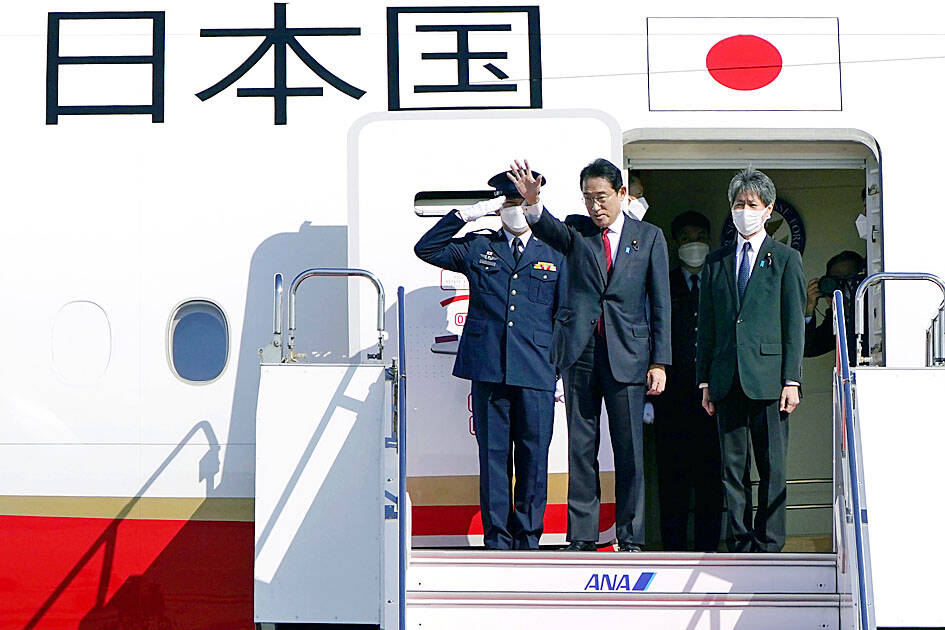Japanese Prime Minister Fumio Kishida, who is traveling to Australia to meet with Australian Prime Minister Anthony Albanese, yesterday said he wants to bolster military and energy cooperation between the two countries amid their shared concerns about China.
Kishida said he hopes to update their 2007 bilateral security pact to factor in the progress they have made and further promote their partnership.
Australia’s liquefied natural gas (LNG) and coal exports are key to a stable energy supply for resource-scarce Japan, and Kishida said he hopes to discuss the future of Japanese resources and energy stability with Albanese.

Photo: AP
“For Japan, Australia is an important country that we share universal values with, such as freedom and democracy, as well as strategic benefits, and it is an important country from the resource and energy point of view,” Kishida said before boarding a flight to Perth.
He added that Australia is a key member of the Quadrilateral Security Dialogue, which also includes the US and India, and was established to discuss regional security and economic issues as a counter to China’s growing influence.
Japan and Australia, both US allies, share a similar vision for regional security, and Japan hopes to elevate its cooperation with Australia. The leaders are hoping to issue a new declaration on security cooperation that would reinforce the 2007 pact looking ahead to the next decade, a Japanese Ministry of Foreign Affairs official said on condition of anonymity, citing protocol.
The pact commits the countries to regional and global peace and stability, as well as cooperation on counterterrorism and rebuilding Iraq after the 2003 war.
Kishida and Albanese are also to consider further implementing the Reciprocal Access Agreement, a security pact Kishida struck in January with then-Australian prime minister Scott Morrison, which removes obstacles to holding joint military exercises in either country, the official said.
Amid China’s growing assertiveness in the region, Japan has been expanding its security cooperation in recent years beyond its only military ally, the US, and has forged close ties especially with Australia. Tokyo also has developed defense ties with other countries in the Asia-Pacific region and Europe.
Kishida is scheduled to hold talks with Albanese today before he meets with Japanese and Australian business representatives, visits a facility related to green energy and meets with Japanese residents before heading back to Japan later today, the Japanese official said.
The leaders are to discuss cooperation in LNG and other energy sources such as ammonia and hydrogen, the person said, adding that Kishida’s meeting in Perth, the capital of Western Australia, is significant, as the state exports most of Japan’s LNG.
Japan depends on Australia for nearly 40 percent of its LNG, and is seeking a stable energy supply amid global disruption.

SECURITY: As China is ‘reshaping’ Hong Kong’s population, Taiwan must raise the eligibility threshold for applications from Hong Kongers, Chiu Chui-cheng said When Hong Kong and Macau citizens apply for residency in Taiwan, it would be under a new category that includes a “national security observation period,” Mainland Affairs Council (MAC) Minister Chiu Chui-cheng (邱垂正) said yesterday. President William Lai (賴清德) on March 13 announced 17 strategies to counter China’s aggression toward Taiwan, including incorporating national security considerations into the review process for residency applications from Hong Kong and Macau citizens. The situation in Hong Kong is constantly changing, Chiu said to media yesterday on the sidelines of the Taipei Technology Run hosted by the Taipei Neihu Technology Park Development Association. With

CARROT AND STICK: While unrelenting in its military threats, China attracted nearly 40,000 Taiwanese to over 400 business events last year Nearly 40,000 Taiwanese last year joined industry events in China, such as conferences and trade fairs, supported by the Chinese government, a study showed yesterday, as Beijing ramps up a charm offensive toward Taipei alongside military pressure. China has long taken a carrot-and-stick approach to Taiwan, threatening it with the prospect of military action while reaching out to those it believes are amenable to Beijing’s point of view. Taiwanese security officials are wary of what they see as Beijing’s influence campaigns to sway public opinion after Taipei and Beijing gradually resumed travel links halted by the COVID-19 pandemic, but the scale of

A US Marine Corps regiment equipped with Naval Strike Missiles (NSM) is set to participate in the upcoming Balikatan 25 exercise in the Luzon Strait, marking the system’s first-ever deployment in the Philippines. US and Philippine officials have separately confirmed that the Navy Marine Expeditionary Ship Interdiction System (NMESIS) — the mobile launch platform for the Naval Strike Missile — would take part in the joint exercise. The missiles are being deployed to “a strategic first island chain chokepoint” in the waters between Taiwan proper and the Philippines, US-based Naval News reported. “The Luzon Strait and Bashi Channel represent a critical access

Pope Francis is be laid to rest on Saturday after lying in state for three days in St Peter’s Basilica, where the faithful are expected to flock to pay their respects to history’s first Latin American pontiff. The cardinals met yesterday in the Vatican’s synod hall to chart the next steps before a conclave begins to choose Francis’ successor, as condolences poured in from around the world. According to current norms, the conclave must begin between May 5 and 10. The cardinals set the funeral for Saturday at 10am in St Peter’s Square, to be celebrated by the dean of the College